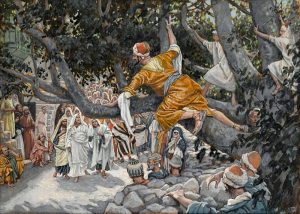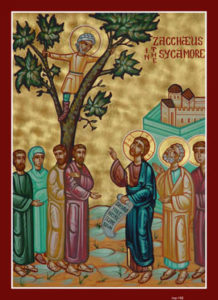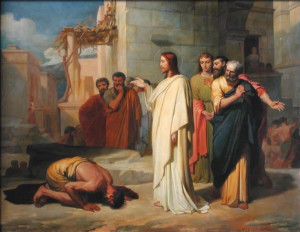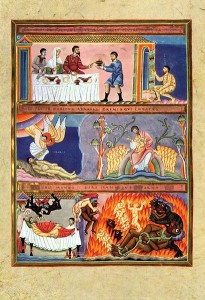Illuminations on the Lectionary readings for Nov. 2, 2025 (Pentecost 21C/Proper 26)
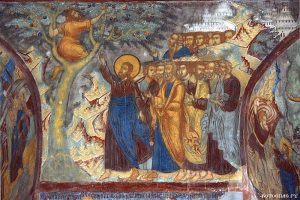
Christ calling Zacchaeus out of the tree (1692-1693). Fresco in the Church of the Epiphany, Yaroslavl, Russia. (Click image to enlarge.)
First Reading: Habakkuk 1:1-4; 2:1-4
“O Lord, how long shall I cry for help, and you will not listen?” This despairing cry of the prophet Habakkuk soon turns toward hope, an idea that we will hear reflected in more of Sunday’s readings. Habakkuk is a minor prophet, a rare participant in the three-year Lectionary cycle. But this short three-chapter book is unusual and fascinating. Unlike most of the prophets, who were called to hear God’s word and pass it on to humanity, Habakkuk shouts out his own warnings. And, having done so, Habakkuk feels left alone without divine assistance. He turns to God with frustration because he doesn’t think God is listening. Then God responds, directing Habakkuk to write his vision down so clearly that a runner could read it while racing past.
First Reading (Track Two): Isaiah 1:10-18
Isaiah’s great book of prophecy gets off to a fiery start. Its first five chapters are filled with God’s angry words of wrath before we even get to God’s call to the prophet. Before all else, we must clearly hear God’s anger about the people’s failure to keep the covenant that their ancestors made through Moses at Mount Sinai. Such wrath comes through clearly in this reading, as God likens Israel to Sodom and Gomorrah, whose people were so vile that God hates them and their works. But, as always, God’s angry judgment is not absolute. Righteousness and justice, the prophet says, are the way to restore God’s love: “Cease to do evil, learn to do good; seek justice, rescue the oppressed, defend the orphan, and plead for the widow.”
Psalm (Track One): Psalm 119:137-144
We hear verses from Psalm 119 fairly often. With its 176 verses, it is the longest of all the Psalms, and selected passages appear a dozen times during the three-year lectionary cycle. While each of its sections offers different poetic language, its underlying message remains consistent: It is a long, loving celebration of God’s teaching understood as law (“Torah”). The verses chosen for Sunday could have come as good advice to those targeted by Habakkuk’s prophecy: When trouble and distress come on us, God’s law and teaching can give us hope.
Psalm (Track Two): Psalm 32:1-8
This passage from Psalm 32 rebounds from Isaiah’s horrific concept of a God too angry to hear the people’s prayers or sacrifices, too outdone to give them even the least attention. In contrast, these verses celebrate the joy that comes when our separation from God that results from sin comes to an end, replaced with the utter joy of knowing God’s forgiveness. No longer groaning with pain that feels like withered bones, the repentant sinner is now guarded against trouble, happily surrounded by shouts of deliverance.
Second Reading: 2 Thessalonians 1:1-4, 11-12
Now we begin a three-week visit with the second letter to the church of Thessalonica in Northern Greece. This letter probably came a generation after the first letter to the Thessalonians, perhaps around 100 CE, written in Paul’s name by a follower long after his death. These early Christians were facing severe Roman persecution. Recognizing this challenge, the letter opens with hearty thanks and gratitude for their steadfast faith despite all that they have had to endure.
Gospel: Luke 19:1-10
The Pharisees often criticized Jesus for hanging around with prostitutes and tax collectors, the most insulting occupations they could think of. Tax collectors were despised because they traitorously sold their services to the hated Roman occupiers, extracting heavy taxes from the people, and often taking a little extra to enrich themselves. Nevertheless, just a week after we heard Jesus praise a tax collector for his humble prayer, we now find Jesus addressing another tax collector – the diminutive Zacchaeus – who had climbed a tree the better to see him. Then Jesus invites himself to dinner at Zacchaeus’s house! Like the praying tax collector in last week’s Gospel, Zacchaeus earns salvation by following Jesus.

